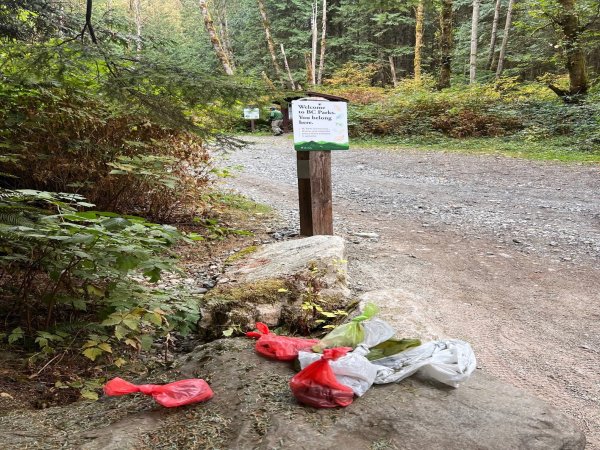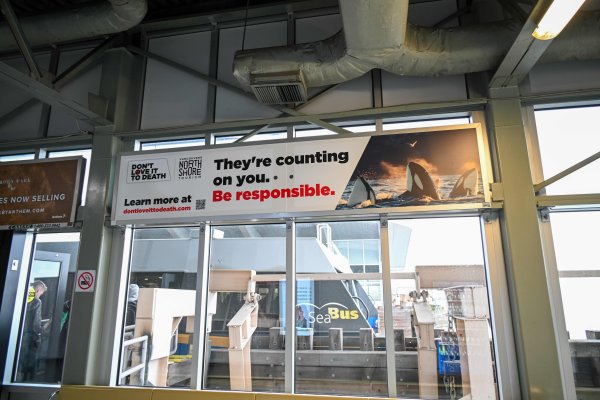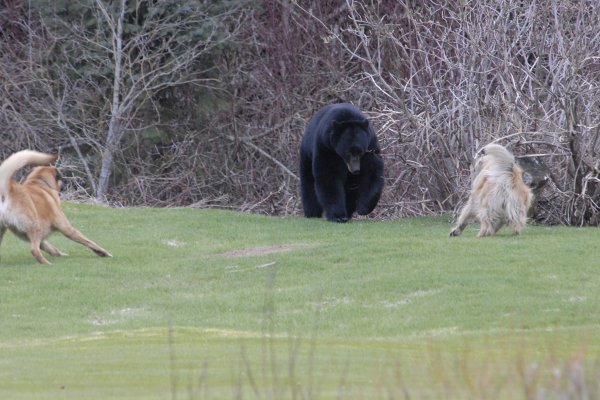AHEAD OF THE MAY LONG WEEKEND, THE 'DON'T LOVE IT TO DEATH' AWARENESS CAMPAIGN SHARES TOP CONCERNS ABOUT BAD BEHAVIOUR IN NATURE AND PROVIDES SOLUTIONS FOR RESPONSIBLE RECREATION
New survey results reveal overcrowding, lack of respect for nature, and garbage and human waste among the negative impacts of recreation in the outdoors
SQUAMISH, B.C. – May 9, 2024 – With May Long Weekend just around the corner, the responsible recreation awareness campaign, Don’t Love It to Death, aims to inspire residents and visitors to make better decisions when recreating outdoors. Now in its second year since launching in July 2022, the Don't Love It To Death awareness campaign reveals the impacts of bad behaviour and gives recreationists the tools and knowledge to protect and preserve the places they love.
A new survey broadly targeting southwest British Columbia residents shows that the top three concerns are overcrowding, a lack of respect for nature, and garbage and human waste. Seventy-nine per cent of the respondents found summer to be the season with the most irresponsible behaviour.

When asked whether they observed poor behaviour outdoors, 68 per cent indicated they regularly observed issues. The survey–commissioned by the Sea to Sky Destination Management Council–captured over 700 responses and just wrapped up. Once the data is further analyzed, it will provide direction on the most pressing impacts of poor behaviour that Don't Love It To Death needs to address.
The concerns found in the survey aren't unfounded. Here are some heart-stopping stats:
-28,404 kilograms of trash removed by Divers for Cleaner Lakes and Oceans since 2013
-603 black bears had to be euthanized in 2023 in B.C., a record and increase from 493 in 2022 according to provincial data on predator statistics for black bears
-1,750 rescue calls involving lost or injured persons were sent to Search and Rescue across British Columbia in 2023
-42% of wildfires on average are human-caused over the last ten years according to the provincial government
While the impacts of bad behaviours in nature make news, corresponding solutions are at the heart of the Don't Love It To Death campaign. The campaign addresses hot-button issues: garbage and human waste, human-wildlife conflict, unsafe behaviour/lack of preparedness, lack of respect for people and the environment, trespassing and disrespectful use of the outdoors, and overcrowding, overuse, and traffic.
Don't Love It To Death works with partners like BC AdventureSmart, BC Wildfire Service, Camper’s Code, Sea to Sky Invasive Species Council and more to give outdoor enthusiasts and visitors the tools and knowledge they need to be mindful of their behaviour and understand their impact on nature, wildlife, and communities through their activities.
The website dontloveittodeath.comhouses practical resources and links to organizations offering useful tips on how to enjoy the outdoors responsibly and sustainably. A new video series called "Bad House Guest," designed for social media and starring comedian and actor Katie Burrell, will launch before the May Long Weekend. The series parallels Katie's outrageous behaviour as a guest in someone's home with poor behaviour that is common when recreating outdoors.

This summer, 158 Don’t Love It To Death signs will be up at trailheads, parks, and natural spaces. Images of the region with thought-provoking messages remind residents and visitors to be aware of their impact and respect the environment, wildlife, and fellow recreationists. Thirty-one jurisdictions are engaged, and more than half of the signs are installed across the region.
Top 6 things to do when you play outside this summer…so you Don't Love It To Death
1. Practice fire safety by obeying fire prohibitions when in place and using campfire best practices. Make sure to download the updated BC Wildfire app.
2. Follow the AdventureSmart Three Ts: Training, Trip Planning, and Taking the Essentials to reduce the severity and frequency of Search and Rescue calls.
3. Familiarize yourself with the 7 Principles of Leave No Trace, including properly disposing of human waste.
4. Keep wildlife wild, and remember you are in bear country. Ensure pets are on leash, give wildlife space, and don't pet/feed animals.
5. Reduce your impact on overcrowding by visiting at off-peak times, exploring less busy areas, and planning ahead with public transit, parking, and permits.
6. Stop the spread of invasive plant species—one of the largest threats to biodiversity—by practicing the tenets of Play, Clean, Go. Clean your boots, gear, pets and vehicles of plant fragments, seed and mud before and after you play outside; and please stay on the trails.

About the Sea-to-Sky Destination Management Council
The Sea-to-Sky Destination Management Council was created in early 2020 to implement the Sea-to-Sky Destination Development Strategy developed by Destination BC. The Council is comprised of community and regional representatives from the Sea-to-Sky planning area and organizations like Indigenous Tourism BC , B.C. Parks, Vancouver, Coast & Mountains tourism region, the Ministry of Jobs, Economic Recovery and Innovation, and the Ministry of Forests.
This Council is focused on developing a Destination Education Initiative to address some of the challenges facing the region, such as unmanaged camping, increased need for search and rescue, and overuse of some areas, trails and recreation sites in urban and rural locations. The Sea-to-Sky Corridor strategy is one of 19 destination development strategies produced between 2016 and 2020 to support the development of BC as a world-class destination.
Expanding beyond the Sea-to-Sky region due to growing interest, the Don’t Love It To Death campaign is lead by a consortium of destination management organizations, including Tourism Whistler, Tourism Squamish, Vancouver's North Shore Tourism Association, Sunshine Coast Tourism, Discover Surrey, Harrison River Valley, Tourism Abbotsford, Tourism Burnaby, Tourism Hope, Cascades & Canyon and Tourism Pemberton.
Quotes
Jen Ford, Squamish-Lillooet Regional District Board Chair
"As residents and visitors to the region, we share an appreciation for the outdoors and natural environment. We also see the effects of poor behaviour, and sometimes, we are the problem. The Squamish-Lillooet Regional District is pleased to see the momentum of the Don't Love it to Death campaign, but we know there is still work for all of us to do, starting with changed behaviour: pack it in, pack it out, respect private property and keep yourself and wildlife safe."
One thing I wish people knew: "To remember to take only photos; leave only footprints."
Jade Richardson, Fire Information Officer, BC Wildfire Service
"British Columbia, including the Sea-to-Sky Corridor, is renowned for its great outdoors where local recreators and tourists alike enjoy camping in BC's parks and recreation sites. Many guests in these spaces enjoy campfires, and while this long-standing tradition provides a warm and beautiful space to gather, it's important to remember that any open fire use can cause a wildfire. Fire use is a privilege, and it is a responsibility that we all share to keep forests safe. BC Wildfire Service relies on the public to play a vital role in preventing wildfires by following regulations and prohibitions and enjoying fire use as permitted and through a common-sense and land-stewardship lens. We appreciate the public's diligence and commitment to this each summer and want to encourage all visitors to do their part to protect these outdoor spaces that we all cherish and value."
One thing I wish people knew: Going into the summer, BC Wildfire Service, in partnership with the Squamish Nation and Sea to Sky Natural Resource District, will be elevating its presence in the Upper Squamish Valley this season. This includes public education through the Wildfire Prevention Ambassador Program, increased patrol through the Fire Wardens program, and an uplift to our compliance and enforcement program with the Conservation Officer Service and Natural Resource Officers.
Jack Crompton, Mayor of Whistler
"Transitioning to lower carbon consumption by cutting waste is key for our community. This means we all need to compost and consider how we can consume less. Our latest waste audit shows over half of Whistler's landfill waste could be diverted through composting, recycling, and other initiatives. Each one of us has a choice. I’m asking our residents and visitors to consider how they can change their habits and ultimately send less materials to the landfill. Preserving the environment and impacting climate change is the greatest mountain we have to climb and it will take everyone joining the journey to succeed."
One thing I wish people knew: “Love this place, reduce our waste. Reducing our consumption is one of the easiest ways to reduce emissions. Please avoid single use items and don't forget to pack your favourite coffee mug when visiting Whistler.”
Lesley Weeks, Executive Director, Tourism Squamish
"While we promote Squamish to the world to grow tourism for our community, we are also committed to responsible tourism. There is so much to love in the Sea-to-Sky, and inspiring our visitors with the knowledge that empowers them to experience Squamish in a way that leaves this place better is what will make tourism sustainable.
One thing I wish people knew: “I wish everyone understood the critical importance of fire safety while enjoying the outdoors in Squamish. Even a small spark can threaten forests and communities. By adhering to fire bans, using designated fire pits, and fully extinguishing all flames, we each contribute to preventing wildfires and protecting the lush landscape that defines this region.”
Sandra Riches, Executive Director, BC AdventureSmart
Dusting off the hiking boots, digging out the tents, bikes and camping gear, all sounds like spring time to us at BC AdventureSmart. Reaching your destination safely (your destination is home) is often overshadowed by excitement, eagerness to hit the trails or assumptions everything will be ok and it won’t happen to me. Together with the Don’t Love It To Death campaign, we remind enthusiasts to prepare for their play and to be rescue-ready this summer. In support of enthusiasts’ safe behaviour and personal preparedness, we encourage you to follow our 3Ts: trip planning, training, and taking essentials.
One thing I wish people knew: “There are 1,750 search and rescue (SAR) incidents every year in British Columbia. A large percentage of those incidents are preventable. They’re preventable by you, enthusiasts, planning ahead, having the right training for the activity and carrying the safety gear required for emergencies. Injury, getting lost or disoriented and exceeding abilities are the top three reasons for SAR calls. If all enthusiasts can ask themselves “How could I prevent an injury? How could I prevent getting lost or disoriented? How could I not exceed my abilities?” It would be a great way to help reduce the number and severity of SAR calls in B.C., which in turn helps our 3,400 SAR volunteer members in the province.
Barrett Fisher, President & CEO, Tourism Whistler
“The Whistler community is committed to preserving the beauty of our natural environment and protecting where we play. The Don’t Love It To Death public education campaign is a critical reminder to recreate responsibly – not just for visitors, but for locals too. Everyone in Whistler should use the principles of Leave No Trace when visiting the outdoors to preserve and support our wildlife and green spaces.”
One thing I wish people knew: “Use recyclable containers to reduce your carbon footprint, and pack out what you pack in. Whistler is located in bear country, and unfortunately, there is no happy ending for garbage-dependent bears.”
Armand Hurford, Mayor, District of Squamish
"Squamish is a magnet for outdoor enthusiasts with its natural beauty and numerous adventure opportunities, and sometimes it is easy to get caught up in the adventure rather than think about the impacts of our actions. We hope this campaign continues its success in reminding both visitors and locals alike to think about how their behaviour affects the environment and wildlife and encourage everyone to shift towards a desire to preserve and protect this beautiful region."
One thing I wish people knew: "I wish people knew when recreating was how much their actions influence the next person's actions. Bad outdoor behaviour can have a snowball effect. If most people practice Leave No Trace principles, it would raise the bar for everyone."
-30-
Related Impacts

1 Garbage And Human Waste
The improper disposal of human waste and garbage is harmful to humans, the environment, and wildlife.
- Kilograms of trash removed by Divers for Cleaner Lakes and Oceans since 2013
- 29,188
- Face masks collected by Vancouver plogger David Papineau
- 40,000

2 Human-Wildlife Conflict
People and pets getting too close to wildlife can lead to conflict, injury, and death.
- BC Parks reservations impacted by bear closures in 2024, up from 106 in 2023
- 128
- Number of black bears euthanized in BC in 2024, down from 603 in 2023
- 303

3 Unsafe Behaviour, Lack Of Preparedness
Unprepared outdoor adventurists put themselves and others at risk of becoming a Search & Rescue or death statistic.
- Volunteer hours spent annually on SAR call-outs, training, administration and SAR prevention in 2022
- 441,019
- Search and Rescue incidents per year in BC
- 1,750

4 Lack of Respect - People & Environment
From trampling on trails to human-caused wildfires, disrespectful behaviour is creating conflict between user groups and damage to the environment and communities.
- Percentage of human-caused wildfires in BC, down from 42% in 2023.
- 30%

5 Trespassing & Disrespectful Use
Disrespect for sensitive ecosystems, Indigenous land, cultural sites, and private property, is hurting communities, wildlife and the environment

6 Overcrowding, Overuse & Traffic
Increased visitation is causing traffic woes, parking issues, overcrowding, and overuse in recreational areas and urban environments.